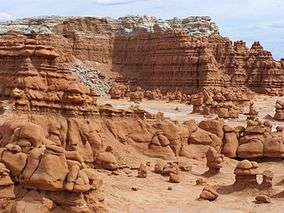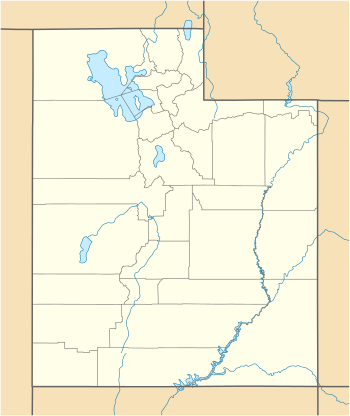Goblin Valley State Park
Goblin Valley State Park is a state park of Utah, in the United States. The park features thousands of hoodoos, referred to locally as goblins,[3] which are formations of mushroom-shaped rock pinnacles, some as tall as several yards (meters). The distinct shapes of these rocks result from an erosion-resistant layer of rock atop relatively softer sandstone. Goblin Valley State Park and Bryce Canyon National Park, also in Utah about 190 miles (310 km) to the southwest, contain some of the largest occurrences of hoodoos in the world.
| Goblin Valley State Park | |
|---|---|
IUCN category V (protected landscape/seascape) | |
 Hoodoos in Goblin Valley | |
 Location in the United States  Location in Utah | |
| Location | Emery, Utah, United States |
| Nearest town | Hanksville, Utah |
| Coordinates | 38°34′00″N 110°42′36″W |
| Area | 9,915 acres (40.12 km2)[1] |
| Established | August 24, 1964 |
| Visitors | 268,760 (in 2017–2018 FY)[2] |
| Operator | Utah State Parks |
| Website | Official website |
The park lies within the San Rafael Desert on the southeastern edge of the San Rafael Swell, north of the Henry Mountains. Utah State Route 24 passes about four miles (6.4 km) east of the park. Hanksville lies 12 miles (19 km) to the south.[4][5]
History

Evidence of Native American cultures, including the Fremont, Paiute, and Ute, is common throughout the San Rafael Swell in the form of pictograph and petroglyph panels. Goblin Valley is noted for several rock art panels, as well as the rock formations. The secluded Goblin Valley was then found by cowboys searching for cattle. Then, in the late 1920s, Arthur Chaffin, later owner/operator of the Hite Ferry, and two companions, were searching for an alternate route between Green River and Caineville. They came to a vantage point about 1 mile (1.6 km) west of Goblin Valley and were awed by what they saw – five buttes and a valley of strange, goblin-shaped rock formations surrounded by a wall of eroded cliffs. In 1949, Chaffin returned to the area he called Mushroom Valley. He spent several days exploring the mysterious valley and photographing its scores of intricately eroded rocks.
Publicity attracted visitors to the valley despite its remoteness. In 1954, it was proposed that Goblin Valley be protected from vandalism. The state of Utah later acquired the property and established Goblin Valley State Reserve. It was officially designated a state park on August 24, 1964. In 2019 the state park was expanded by adding 6,261 acres of federal land.
2013 vandalism

In October 2013, a delicately balanced hoodoo was intentionally knocked over by a Boy Scout while two other men watched, one of whom recorded a video that was later uploaded to the Internet.[6] The men claimed that the hoodoo appeared ready to fall, and that it was intentionally knocked over to prevent park visitors from being hurt.[7] The hoodoo formation had existed for many millions of years, having formed out of rock that dated back as far as 165 million years.[3][7] The average rate of erosion of a hoodoo is approximately 2–4 feet (0.6-1.3 m) every 100 years.[8]
The two leaders were subsequently dismissed from their leadership roles by the Utah National Parks Council, which is a local council of the Boy Scouts in Utah. The national Boy Scouts then removed the men from the scouting organization altogether.[9] In January 2014, two of the men—the one who toppled the hoodoo and the cameraman—were arraigned on felony charges of "criminal mischief" and "intentionally damaging, defacing and destroying property."[10] The two men pleaded guilty to lesser charges of criminal mischief and attempted criminal mischief, and received a sentence of one year probation plus fines and case-related fees.[11]
Plants and animals
The flora of Goblin Valley include Mormon tea, Russian thistle, Indian ricegrass, and various cacti, as well as junipers and pinyon pines at higher elevations.[12]
Fauna include jackrabbits, scorpions, kangaroo rats, pronghorns, kit foxes, midget faded rattlesnakes, and coyotes.[12]
Geology
The unusual stone shapes in Goblin Valley result from the weathering of Entrada sandstone. The Entrada consists of debris eroded from former highlands and redeposited on a former tidal flat of alternating layers of sandstone, siltstone, and shale. The rocks show evidence of being near the margins of an ancient sea with the ebb and flow of tides, tidal channels that directed currents back to the sea and coastal sand dunes.
Joint or fracture patterns within the Entrada sandstone beds created initial zones of weakness. The unweathered joints intersected to form sharp edges and corners with greater surface-area-to-volume ratios than the faces. As a result, the edges and corners weathered more quickly, producing the spherical-shaped 'goblins'.
The Entrada sandstone from which the hoodoos developed was deposited in the Jurassic period around 170 million years ago.[13]
Climate
Average daytime highs in the summer average between 90 and 105 °F (32 and 41 °C), though the low humidity, high elevation, and sparse vegetation allow evenings to cool off rapidly to about 50 °F (10 °C). Also, the intermittent summer monsoon arriving from the south can bring intense and localized thunderstorms. The rugged terrain and intense rainfall can lead to devastating flash floods, while the low humidity combined with gusty winds and frequent lightning can spark wildfires. Winters have colder temperatures and occasional snow, with temperatures above freezing most days, but often dropping as low as 10 °F (−12 °C) at night. The average precipitation is less than 8 inches (20 cm).
Film
Goblin Valley was prominently featured in the movie Galaxy Quest (1999) as an alien planet. The eroded sandstone dunes in the valley inspired the design of the fictional planet’s rock monsters.[14]
.png)
References
- Utah.com. "Goblin Valley State Park". Utah.com LC. Retrieved 2011-02-05.
- "Utah State Parks Visitation Data by Fiscal Year, 2018 Visitation". Utah State Parks. Archived from the original on January 8, 2019. Retrieved January 8, 2019.
fiscal year from July 2017 to June 2018
- Watkins, Tom (18 October 2013). "Created over millennia, destroyed in seconds". CNN. Turner Broadcasting System, Inc. Retrieved 25 October 2013.
- San Rafael Desert, Utah, 30x60 Minute Topographic Quadrangle, USGS, 1986
- Hanksville, Utah, 30x60 Minute Topographic Quadrangle, USGS, 1980
- Grenoble, Ryan (20 October 2013). "Boy Scout leaders topple ancient rock formation in Utah's Goblin Valley State Park (VIDEO)". The Huffington Post. TheHuffingtonPost.com, Inc. Retrieved 1 February 2014.
- Stecklein, Janelle; Dalrymple II, Jim (18 October 2013). "Boy Scout leaders destroy ancient formation in Utah's Goblin Valley". Salt Lake Tribune. Digital First Media, MediaNews Group. Retrieved 18 October 2013.
- "Hoodoos". National Park Service. n.d. Retrieved 2016-04-08.
- Duke, Alan (21 October 2013). "Men who toppled ancient boulder get booted by Boy Scouts". CNN. Turner Broadcasting System, Inc.
- Botelho, Greg; Watkins, Tom (31 January 2014). "Ex-Boy Scout leaders involved in pushing over ancient Utah boulder charged". CNN. Turner Broadcasting System, Inc. Retrieved 31 January 2014.
- Ortiz, Erik (2014-03-19). "Ex-Scouts Leaders Who Knocked Over Ancient Rock Get Probation". NBC News. Archived from the original on 2016-04-02.
- "Goblin Valley State Park Brochure" (archive). stateparks.utah.gov. State of Utah. July 2017. Retrieved January 7, 2019.
- Mark Milligan (1999). "The Geology of Goblin Valley State Park" (PDF). Utah GeologicSurvey. p. 10. Retrieved October 18, 2013.
- Jackson, Gordon (March 8, 2016). "33 Secrets You Probably Never Knew About the Making of Galaxy Quest". io9.gizmodo.com. Gizmodo Media Group. Retrieved February 4, 2019.